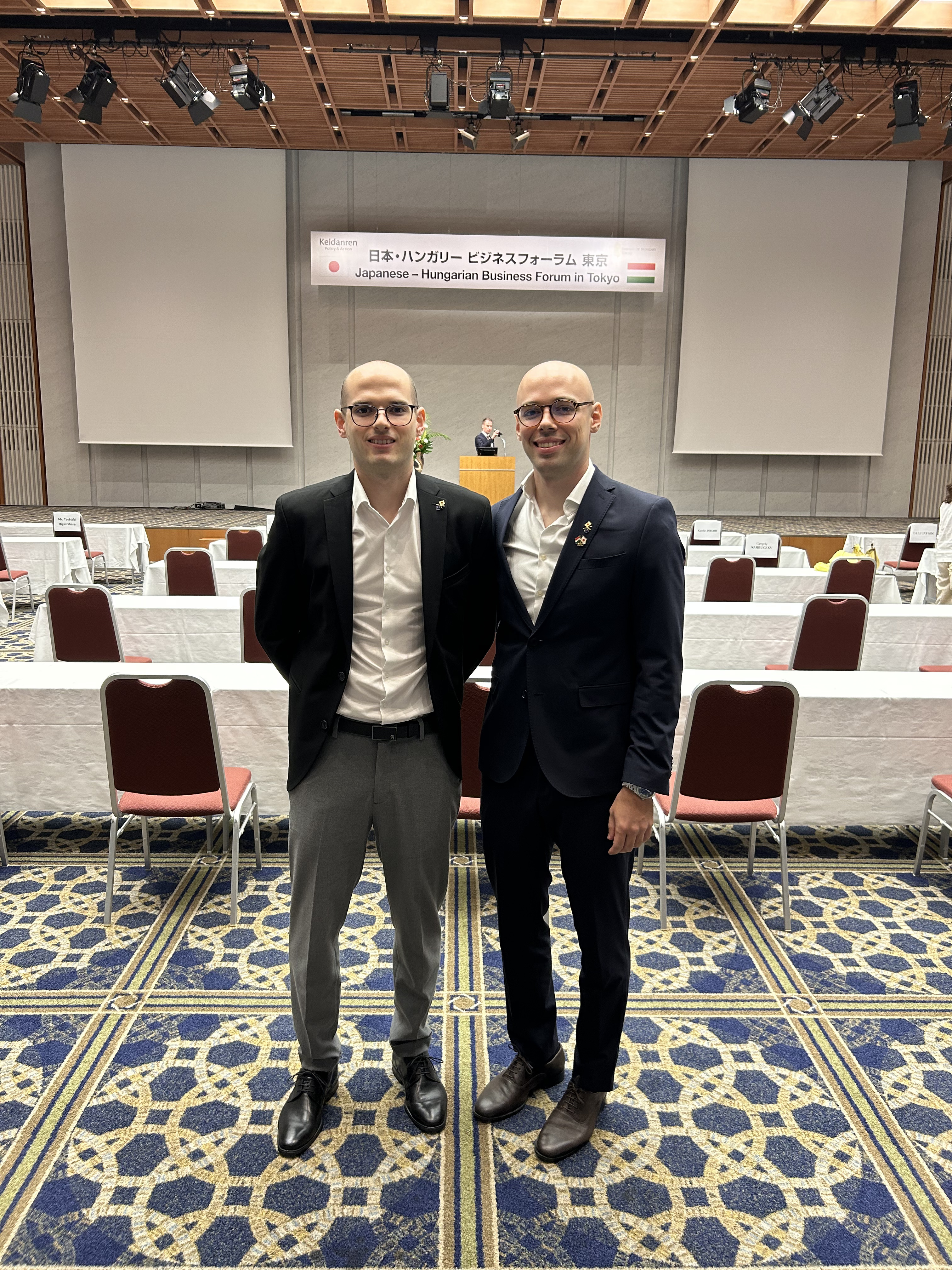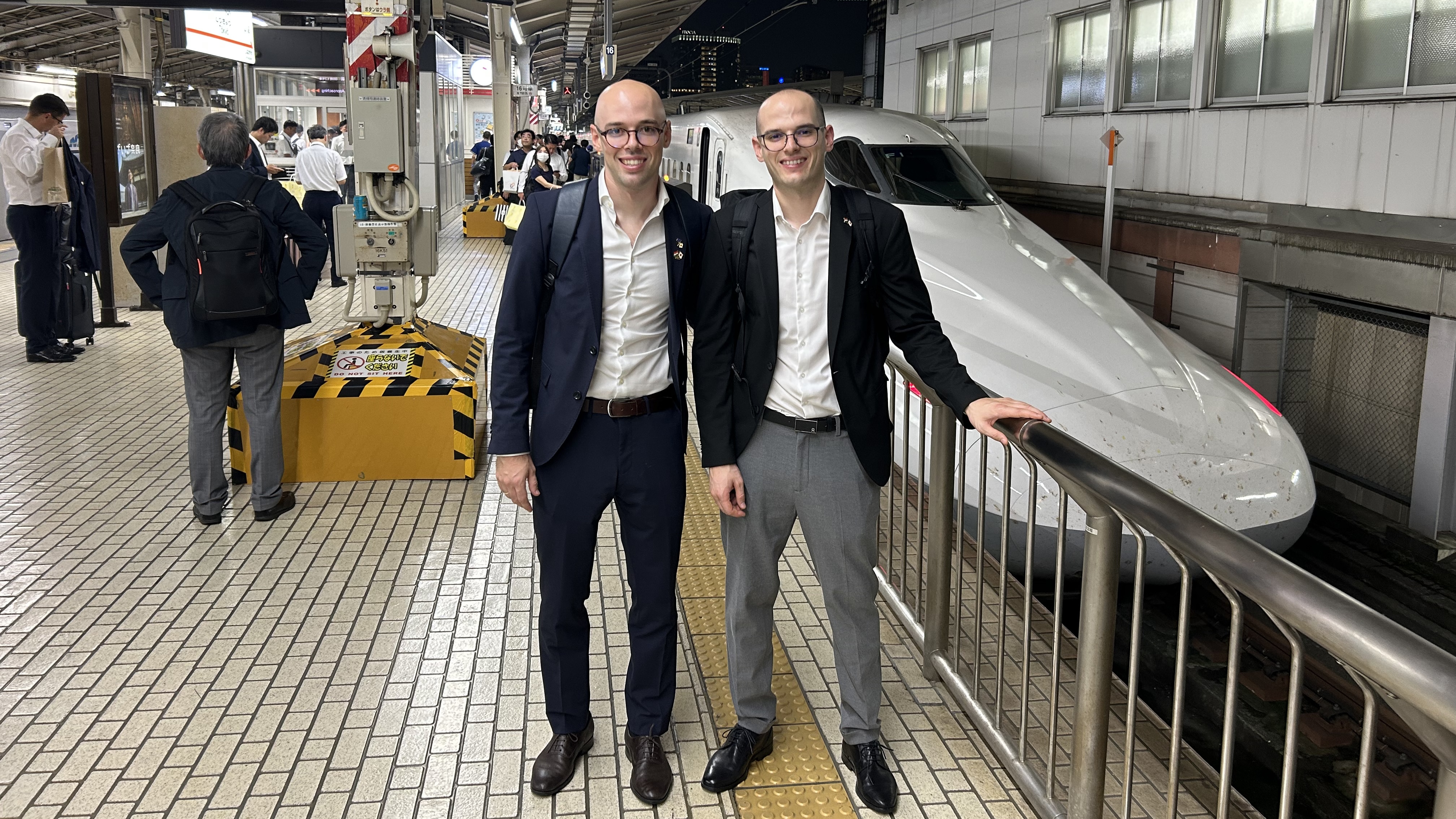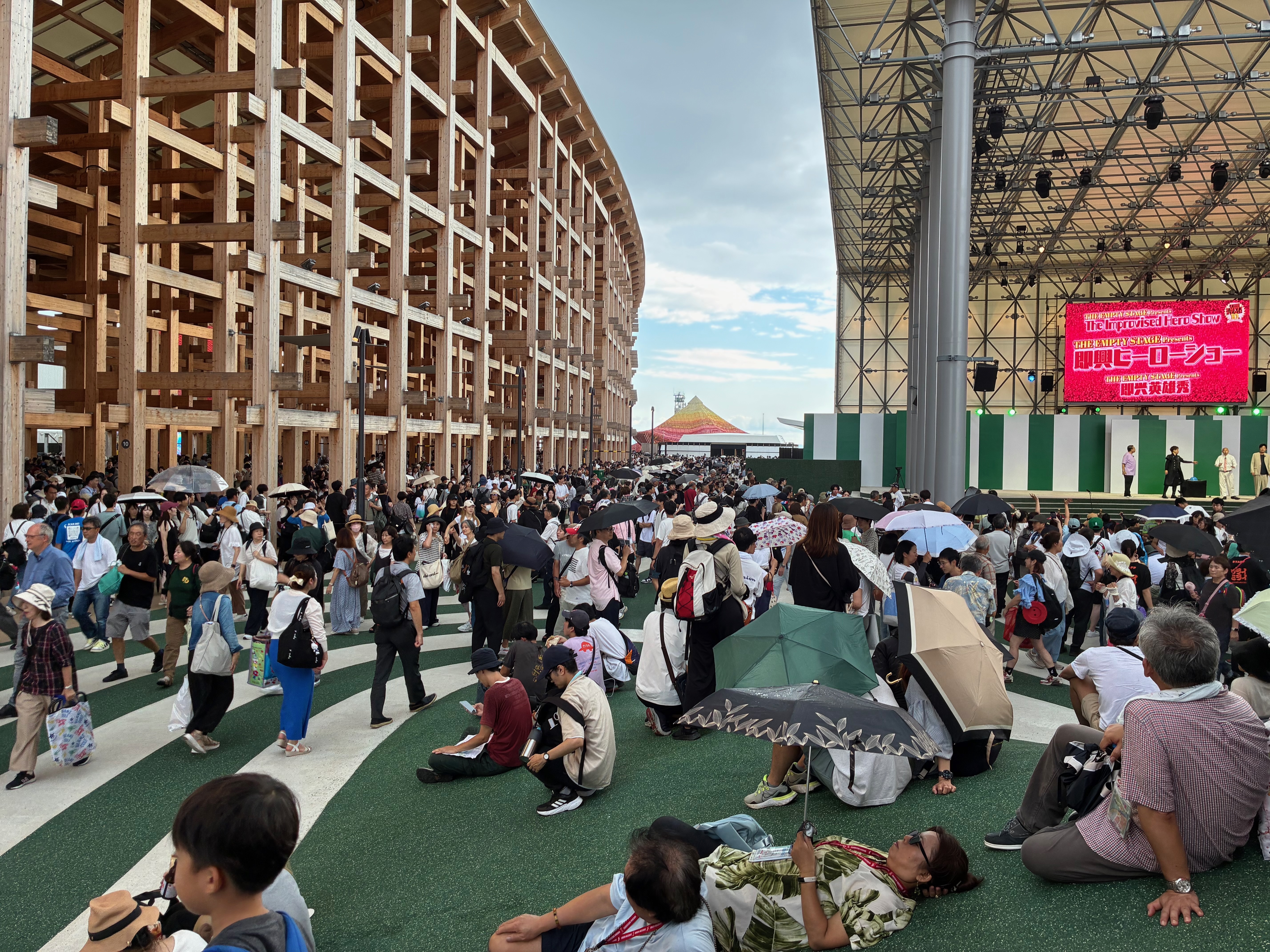Blog
From Market to Partner: Insights from Scriptide’s Founders on Japan
From Market to Partner: Insights from Scriptide’s Founders on Japan
Scriptide has been active in the Japanese market for five years. Following their latest business trip to Japan, we spoke with CEO Daniel Fazekas and COO Tamas Fazekas, the company’s founders, about their experiences, impressions of Japanese business culture, and why they see Japan as such an important market. During their stay, they attended the Japan–Hungary Business Forum, visited the Novare Innovation Center, and explored the site of the upcoming World Expo in Osaka.
Written by
Ariadne Mavrogenis
Last updated
OCT 03, 2025
Topics
#business
Length
8 min read

From Market to Partner: Insights from Scriptide’s Founders on Japan
Interview with Daniel Fazekas (CEO) and Tamas Fazekas (COO), founders of Scriptide.
Scriptide has been active in the Japanese market for five years. Following their latest business trip to Japan, we spoke with two of the company’s founders and owners, CEO Daniel Fazekas and COO Tamas Fazekas, about the experiences they brought home, their impressions of Japanese business culture, and why they consider this market so important. During their stay, they attended the Japan–Hungary Business Forum, visited the Novare Innovation Center, and explored the site of the upcoming World Expo in Osaka.
Daniel, you gave two presentations during the event. What topics did you cover, and how did the Japanese audience receive them?
Daniel: I mainly introduced Scriptide and the way we work effectively with Japanese partners. Our collaboration is based on a Team Augmentation model, with a key role played by the so-called bridge person. This role not only helps overcome language barriers between teams but also provides guidance on cultural differences, ensuring smoother cooperation.
I also spoke about how we handle time zone differences, since this is a question we often get. Most of the time, it’s really not an issue. In practice, it requires very little adjustment from our side, as Japan is ahead of Hungary. By scheduling meetings in the afternoon in Japan, which translates to early morning in Hungary, we can immediately start working on the inputs we receive, and by the time our Japanese partners begin their next day, we often already have solutions ready to share. From my impression, the audience was engaged and hopefully found the presentation useful.
Tamas: I had the same impression. In fact, one of the participants came up to me afterwards and mentioned how much he enjoyed the presentation, saying our collaboration model seems effective. It was great to receive such positive feedback.

What specific business opportunities do you see in Japan that could become defining for Scriptide in the coming years?
Daniel: Japan faces a significant shortage of software developers, while in many other parts of the world there’s actually a relative oversupply of talent due to current market conditions. In addition, Japan is eager to diversify its economic and strategic partnerships beyond China and India, strengthening its cooperation with Europe. This is very promising for us, and we believe it can lead to highly fruitful, long-term relationships. European and Hungarian political leadership is also keen on enhancing business collaboration between Japanese and Hungarian companies.
Tamas: From an operational perspective, I see a promising win-win situation. Japanese companies need skilled developers, and that’s what we can provide. Our experience so far shows that we can bring real value to this market, and there’s a genuine need for highly skilled software engineers. I’m optimistic that in the coming years we’ll be able to strengthen our presence even further.

This year Japan is hosting the World Expo in Osaka. You also visited the site. What were your impressions?
Tamas: This was the first World Expo for both of us, and we were amazed by the scale and the crowds—it’s not something you see every day in Europe, especially not in Hungary. One of the most remarkable innovations we encountered was a lab-grown human heart developed at Osaka University, building on iPS cell technology pioneered by Nobel laureate Shinya Yamanaka. Although it’s still a prototype, it was truly inspiring to witness how far Japanese science and innovation have progressed.
Daniel: For me, the experience was enriched by the journey itself. We traveled from Tokyo to Osaka by shinkansen, and it was incredible to experience this marvel of Japanese technology firsthand—speed, precision, and comfort all in one. We were also quite "fortunate" to have experienced a 90-minute delay because of a person trespassing—haha.

You also had the chance to visit the Novare Innovation Center. What were your impressions?
Daniel: The center is operated by Shimizu Corporation, one of the largest construction companies in Japan. It plays an important role in connecting established companies with startups and research institutions. It was interesting to see how innovation is organized and supported in such a structured way.
Tamas: I agree with Daniel. What impressed me most was how this structure translates into practical solutions. For example, we saw a sensor-based system that detects which employee is in a given room and automatically adjusts the climate settings to their personal preferences. It’s a great illustration of how Japanese innovation combines advanced technology with very practical applications for everyday work environments.
Looking back on the trip, what was the most memorable moment?
Daniel: During our stay, we met a Japanese businesswoman and a gentleman who happened to be planning a visit to Hungary in October. We arranged to meet them in Budapest and offered to show them around the city. It felt remarkable that, in such a large country as Japan, we happened to meet people who will be visiting Hungary. I thought it was a great opportunity to get to know each other better, so overall, it was a memorable experience for me.
Tamas: For me, it was more about the overall experience: it was an intense few days full of new encounters, insights, and connections. It’s hard to single out one moment.
How is working with Japanese partners different from collaborating with other nationalities?
Tamas: Working with Japanese partners is different because they have a very long-term perspective. They value mutual respect, punctuality, and dedication to work, and they carefully consider every step of a project. This approach contrasts with what we sometimes see in other markets, where speed or immediate results may be prioritized over building a solid foundation for collaboration.
Daniel: I’d add that their attention to detail is exceptional. Even seemingly minor tasks are treated seriously and thoughtfully, which often proves essential over time. Their specifications and processes are precise and well-structured, making collaboration very clear and reliable.
How has your approach to meetings and negotiations in Japan changed now that you’ve been there several times?
Daniel: Initially, we approached meetings quite directly, focusing on securing contracts quickly, like we were used to in Europe. Over time, we realized that in Japan, meetings are more about building trust and understanding each other’s ways of working than closing deals immediately. This insight has changed how we prepare for and participate in discussions, making us more attentive to establishing rapport and exploring common goals before diving into business specifics.
Tamas: Exactly. Over the years, we’ve learned that meetings with Japanese partners are fundamentally different from what we might expect elsewhere. In Japan, the first priority is building trust and establishing a mutual understanding of each other’s values and working style. Personal interaction is highly valued, and initial meetings are rarely about closing deals immediately. Instead, these meetings are opportunities to explore how both companies can collaborate effectively in the long term. Once a solid foundation of trust is established and both sides understand each other’s approach, business agreements naturally follow in subsequent meetings. Visiting two or three times a year has become a key part of this process, allowing us to nurture these relationships gradually and consistently.

What is one Japanese business value you’d like to bring back and apply at home?
Tamas: Definitely punctuality, and the thoroughness with which they approach everything.
Daniel: Their diligence and humility are qualities I deeply admire.
How do you see Japanese–Hungarian business cooperation evolving over the next decade?
Tamas: Based on our experience, I believe this partnership will become increasingly strong and mutually beneficial. And it’s not just about Scriptide—both nations, and even the EU as a whole, can gain a lot from closer cooperation with Japan.
Daniel: I agree. Politically and economically, there’s a shared interest in strengthening these ties. Programs are already underway to encourage European companies to explore opportunities in Japan. In fact, thanks to one such program, we’ll be heading back to Japan in October.
Can you tell us more about the program and where people can meet Scriptide?
Daniel: We were selected by the EU–Japan Center for Industrial Cooperation to represent Scriptide at CEATEC, Japan’s largest IT and electronics exhibition, as part of the EU Pavilion, from October 14–17. This is a fantastic opportunity to showcase our solutions and connect with potential partners. To make the most of our time in Japan, we’ll also participate as exhibitors at Japan IT Week in Tokyo from October 22–24. Both events will give us the perfect opportunity to meet people, exchange ideas, and share how we collaborate with Japanese partners.

Finally, what does the Japanese market mean for Scriptide’s future?
Daniel: For us, Japan is not just a new market, it’s a long-term strategic partner.
Tamas: I feel the same way. Japan is a key part of our future, and we believe that together we can create tremendous value in the years to come.
Scriptide is a highly skilled software development company that specializes in custom, complex B2B software solutions. We offer a wide range of services, including digital transformation, web and mobile development, AI, blockchain, and more.
Get a free IT consultation. We are excited to hear from you.
You might also like these articles!
Click for details
Japan’s IT Sector in 2026
As Japan steps into 2026, its IT sector is quietly transforming. Companies face growing pressure to innovate, yet a persistent shortage of skilled professionals is slowing the adoption of key technologies like public cloud and AI. Without the right talent and strategies, organizations risk falling behind in an increasingly digital and interconnected global economy.
#business
•
JAN 20, 2026
•
4 min read
Click for details
Cultural Foundations of UX: Understanding Japanese User Behavior
Effective UX design starts with understanding the people you’re designing for. Culture shapes how users interpret information, navigate interfaces, and make decisions. That’s why a design that works well for a Western audience won’t necessarily work for an Eastern one. Culture significantly influences how we perceive the world and how we interact with technology. When we understand the cultural variables that shape our users’ perceptions, we can more accurately identify what needs improvement and design experiences that feel intuitive to them. After reading this article, you will gain insight into how deeply culture impacts UX design, and why a one-size-fits-all approach rarely works across different regions.
#business
•
DEC 08, 2025
•
5 min read